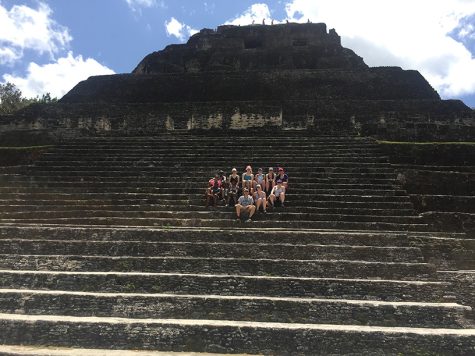2023 Alternative Spring Break Trip takes on Belize
March 2, 2023

As the days get warmer, students are already making their plans for Spring Break. Whether it be booking plane tickets to Florida, securing concert tickets, or buying a whole new wardrobe for their upcoming vacation, the days are counting down in everyone’s heads.
But Spencer Moser, the Director of Civic and Community Engagement here at MCLA, has something different to offer for the highly anticipated week.
From March 11th through the 18th, students who signed up for the Alternative Spring Break Trip to Belize will be experiencing the same fun in the sun, but with community service projects in the mix.
The trip offers students the chance to leave campus – and the country – for the week, and partake in different community service projects, cultural exploration, and touring the country.
Although the words “Spring Break” in the title can be misleading, Moser assures that this trip is immersive and educational in a way that defies the stereotype.
“A lot of us are trying to move away from the ‘Spring Break’ in the title because it’s during the spring break physically, but it’s so different than traditionally what people might think of a spring break trip,” Moser said, “It is a lot more demanding, and in many ways educational.”
During the trip, students take tours of the Mayan temples and walk through the ruins, tour limestone caves, take walks through the jungle, canoe down a river, and even observe produce farms— all with educational purposes in mind.
For example, when observing the produce farms, the intent is to teach the students about migration labor, and the chain of production that gets the produce to our grocery stores. They will witness the farming of everything from oranges and grapefruits, to coffee, cacao and chocolate.
“It’s quite revealing and profound for a lot of us then, we can think about when we’re pouring Minute Maid orange juice or having a cup of coffee, we can now have a deeper sense of everything that’s involved within that to get there,” said Moser.
On top of learning the culture through these first-hand experiences, students also meet with educators on a daily basis to learn more about different aspects of Belize they may not see in their face-to-face travels.
“Whether it’s immigration, the different ethnic groups, the political system, the economic system, topography – we’ll have that as well,” Moser shared.
The other aspect of the trip is the community service, which Moser shared will be held at a local school this year. Anything from teaching a class, helping paint a mural, and playing outside with the kids are on the table.
When asked about recent trips, Moser shared that this is the first trip back since the beginning of COVID. Due to unforeseen cancellations in previous years, the Belize trip hasn’t been held in 3 years.
“There’s this palpable excitement that the students and myself feel about getting the passport, getting on the plane, having this really exciting experience, and doing something new that’s been taken away from us in many ways the past couple years,” Moser said.
For many of these students, it’s their first time leaving the state, let alone leaving the country, so it’s an important task for the staff to help make them feel comfortable on the trip. Moser explained that this aspect is often his favorite part, as he is along for the ride with these students from start to finish and is there to help them navigate the experience.
He went on to say that many students often feel the weight of the trip immediately, while some reach back out years later to thank him for his role in their understanding of the trip.
“They would say to me that as time goes by, [they’re] realizing and feeling the impact of the trip more and more,” Moser said.
He also explained that the trip and the experiences wouldn’t be the same if it weren’t for their partners in Belize, Monkey Bay, and for the Advancement Office and Financial Aid Office. Moser said it makes a big difference for students being able to fully appreciate the trip and lends to their excitedness towards it.
Although there are many beautiful sights and immersive experiences for everyone involved in Belize, Moser said that the best experience is being a catalyst for student’s growth and impact as a result.
Speaking on the picture-perfect moments he’s witnessed through his years of advising the trip, he went on to say, “Those are amazing moments, but equally so are the longer-lasting impact